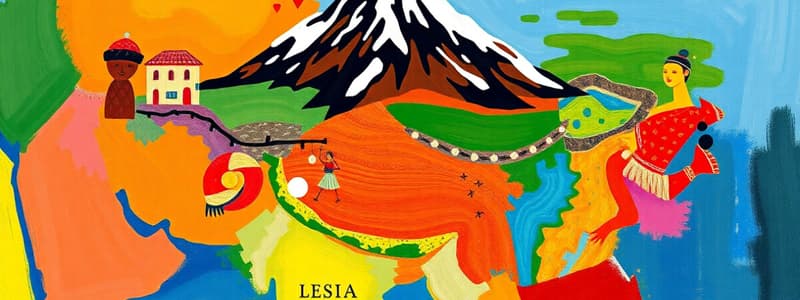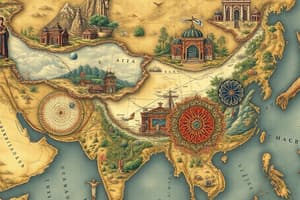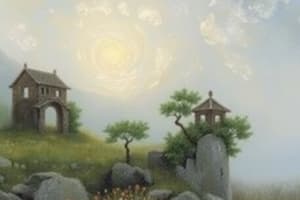Podcast
Questions and Answers
What percentage of the world's population resides in Asia?
What percentage of the world's population resides in Asia?
- 30%
- 50%
- 70%
- 60% (correct)
Asia connects different parts of the world due to its size and location.
Asia connects different parts of the world due to its size and location.
True (A)
Name the highest point in Asia.
Name the highest point in Asia.
Mt. Everest
Asia covers about ______ million square kilometers.
Asia covers about ______ million square kilometers.
Match the regions of Asia with their descriptions:
Match the regions of Asia with their descriptions:
What is the lowest point in Asia?
What is the lowest point in Asia?
Asia consists of only a few countries.
Asia consists of only a few countries.
What are three major languages spoken in Asia?
What are three major languages spoken in Asia?
Which of the following is NOT a method of plateau formation?
Which of the following is NOT a method of plateau formation?
The Tibetan Plateau is often referred to as the 'Roof of the World.'
The Tibetan Plateau is often referred to as the 'Roof of the World.'
What is the largest plateau in Asia?
What is the largest plateau in Asia?
The ___ Plateau is found in south-central India and is shaped like a triangle.
The ___ Plateau is found in south-central India and is shaped like a triangle.
Which plateau is known for its rich deposits of oil and natural gas?
Which plateau is known for its rich deposits of oil and natural gas?
Match the following plateaus with their descriptions:
Match the following plateaus with their descriptions:
What are sediments?
What are sediments?
Wind can only erode land but cannot form plateaus.
Wind can only erode land but cannot form plateaus.
What is the highest mountain range in the world?
What is the highest mountain range in the world?
The Ural Mountains extend for approximately 3,000 kilometers.
The Ural Mountains extend for approximately 3,000 kilometers.
What significant role has the Hindu Kush mountain range played?
What significant role has the Hindu Kush mountain range played?
Mount Everest is part of the ______ mountain range.
Mount Everest is part of the ______ mountain range.
Match the following mountain ranges with their geographical significance:
Match the following mountain ranges with their geographical significance:
Which of the following countries is NOT part of the Himalayas?
Which of the following countries is NOT part of the Himalayas?
Plateaus are flat or gently sloping areas of land that are lower than the surrounding land.
Plateaus are flat or gently sloping areas of land that are lower than the surrounding land.
What geological processes can form plateaus?
What geological processes can form plateaus?
Flashcards
Asia
Asia
The largest continent on Earth, covering about 30% of the land and home to around 60% of the world's population.
Regions of Asia
Regions of Asia
Asia is divided into six main regions: Western Asia, Central Asia, Southern Asia, Eastern Asia, Southeastern Asia, and Northern Asia.
Mt. Everest
Mt. Everest
The highest point on Earth, located in the Himalayas.
The Dead Sea
The Dead Sea
Signup and view all the flashcards
Countries in Asia
Countries in Asia
Signup and view all the flashcards
Languages in Asia
Languages in Asia
Signup and view all the flashcards
Size of Asia
Size of Asia
Signup and view all the flashcards
Landscapes in Asia
Landscapes in Asia
Signup and view all the flashcards
What is erosion?
What is erosion?
Signup and view all the flashcards
What are sediments?
What are sediments?
Signup and view all the flashcards
What is a plateau?
What is a plateau?
Signup and view all the flashcards
What is tectonic uplift?
What is tectonic uplift?
Signup and view all the flashcards
How can volcanic activity form a plateau?
How can volcanic activity form a plateau?
Signup and view all the flashcards
How can wind deposition form a plateau?
How can wind deposition form a plateau?
Signup and view all the flashcards
How can glacial erosion form a plateau?
How can glacial erosion form a plateau?
Signup and view all the flashcards
What is a physical map?
What is a physical map?
Signup and view all the flashcards
The Himalayas
The Himalayas
Signup and view all the flashcards
Hindu Kush
Hindu Kush
Signup and view all the flashcards
Ural Mountains
Ural Mountains
Signup and view all the flashcards
What is the highest mountain range in the world?
What is the highest mountain range in the world?
Signup and view all the flashcards
How long is the Himalayan mountain range?
How long is the Himalayan mountain range?
Signup and view all the flashcards
What are some characteristics of the Hindu Kush?
What are some characteristics of the Hindu Kush?
Signup and view all the flashcards
What are some key facts about the Ural Mountains?
What are some key facts about the Ural Mountains?
Signup and view all the flashcards
Study Notes
Geographical Wonders of Asia
- Asia is the largest continent, covering roughly 30% of Earth's landmass and home to about 60% of the world's population.
- It stretches from the Arctic Ocean in the north to the Pacific Ocean in the east, the Indian Ocean in the south, and to Europe in the west.
- Asia comprises six major regions: Western Asia, Central Asia, Southern Asia, Eastern Asia, Southeastern Asia, and Northern Asia, each with unique cultures, histories, and landscapes.
- Asia's diverse geography includes deserts, mountains, and tropical forests.
- Its total area is approximately 43.8 million square kilometers.
- The highest point on Earth, Mount Everest (29,029 ft/8,848 meters), is located in the Himalayas.
- The Dead Sea, located below sea level, is the lowest point in Asia.
- Major cities such as Tokyo have populations exceeding 34 million people, showcasing Asia's high population density.
- Asia is home to many countries, including China, India, Japan, and Afghanistan among nearly 50 total countries.
- Asian languages include Mandarin, Hindi, Arabic, and Russian, though hundreds of other languages exist in various countries.
Mountain Ranges in Asia
- Asia boasts some of the world's tallest and most beautiful mountains.
- The Himalayas are the highest mountain range, spanning across several countries in South Asia (India, Nepal, Bhutan, and parts of China).
- The Himalayas are approximately 2,400 km long and contain numerous peaks exceeding 8,000 meters, with Mount Everest being the highest.
- The Himalayas are recognized for their scenic views, diverse plant and animal life, and significant cultural history.
- The Hindu Kush range stretches across Afghanistan, Pakistan, and Tajikistan, featuring rocky terrain and high peaks, impacting regional history, culture, and trade routes.
- The Ural Mountains, located between Europe and Asia in Russia & Kazakhstan, serve as a natural boundary. While not as high as other ranges, they are a significant geological feature and hold mineral deposits.
Asia Plateaus
- Plateaus are flat or gently sloping elevated landforms, higher compared to the surrounding land.
- Plateaus can form through uplifting, volcanic activity, or erosion.
- Asia has three primary plateaus:
- The Deccan Plateau, located in south-central India, is shaped like a triangle, stemming from volcanic activity. It is known for its fertile black soil.
- The Iranian Plateau, spanning in southwestern Asia, covering about 3 million square kilometers, features dry climates, deserts, and a substantial presence of oil and natural gas.
- The Tibetan Plateau, also called the "Roof of the World," covers approximately 2.5 million square kilometers and is the highest and largest plateau in Asia. This is the source of many major Asian rivers like the Indus, Ganges, Brahmaputra, Yangtze, and Yellow Rivers.
Studying That Suits You
Use AI to generate personalized quizzes and flashcards to suit your learning preferences.




